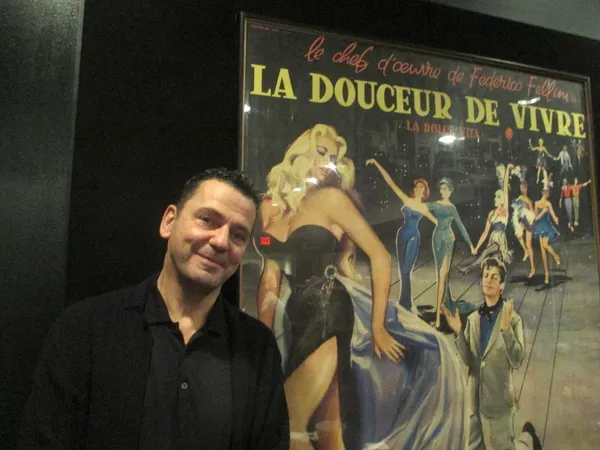Christian Petzold's latest, Transit, shot by his long-time cinematographer Hans Fromm, stars Franz Rogowski and Paula Beer with Barbara Auer, Lilien Batman, Alex Brendemühl, Godehard Giese, Maryam Zaree, and Matthias Brandt, positions Anna Seghers's novel Transit (originally published in 1944) about a young, nameless man who escaped a concentration camp into present-day Marseille. He travels through France in 1942 in the hopes to obtain a transit visa. Like his counterpart, Georg (Rogowski) finds himself among refugees and while on a mission to deliver a letter, discovers a dead writer's unfinished manuscript.
 |
| Christian Petzold on Franz Rogowski in Transit: "Georg is a man without any ballast. He is empty. He has nothing." Photo: Anne-Katrin Titze |
There is no place like home to return to, the future is unclear and hanging by bureaucratic threads as we follow a man trapped in limbo, for decades, much longer it seems than he himself has been alive. With Transit, Christian Petzold takes a bold step in regards to movie conventions about time.
At the Film Society of Lincoln Center, I started out with Christian on the songs he used in Phoenix and Transit.
Anne-Katrin Titze: Your previous film Phoenix was haunted by the song Speak Low [by Kurt Weill] and this one, Transit, is haunted by Abendlied. It sums up so much and stands at the core of the film. I had never heard of it before, and when I spoke to Franz [Rogowski], he said he had never heard of it before. But he sang a bit for me.
Christian Petzold: Really? Oh, yeah, you said it in the interview.
AKT: So my first question is: Can you sing one line to me?
CP (starts singing): "Ameise rast nach Haus; kleiner Bär kommt nach Haus."
AKT: Thank you - the ant and the bear are coming home! You wrote me that the song is one you loved and it is one you sang to your children.
CP: Yes. In the late Seventies when I was 16 or 17 years old, I was a really, really fundamental Communist. Like all 16, 17-year-old boys, when they do something, they are fundamental. I want to destroy everything! I just read Communist texts and Communist essays and know everything about Karl Marx and the economy but I know nothing about love. But I know everything about politics. And then I was at a concert by Wolf Biermann, Franz Josef Degenhart, and Hans Dieter Huesch.
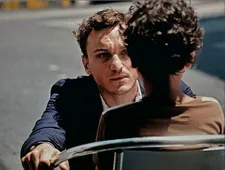 |
| Christian Petzold on Georg (Franz Rogowski) and a song with Driss (Lilien Batman): "In this moment something happens. The ballast is coming back." |
AKT: Who is the composer of Abendlied, the third one is.
CP: This is the composer of Abendlied. The first and the second are communists, one from the German Democratic Republic, the other from West Germany. And the third one was Hans Dieter Huesch and he is singing this song, Abendlied. And I started, I must say, I started crying there. Because it is something that reminds me of something I'm looking for. It's something about childhood, home, relief, and death. Because to come home in the evening and everything is okay - Hans Dieter Huesch, his last sentence when he's singing is "The old child is coming home."
He was 60 years old then when he was singing the song. And the old child is coming home with experience, with love, also with a balance of complexity. But in very, very simple words. Just some names of animals. Also some very, very simple sentences about love and living but in a fantastic atmosphere of - this is relief at the end. Perhaps there's a tomorrow, perhaps not, but we have done a good thing.
To hear this for a refugee! The fate of a refugee, you know, the first thing, a refugee is like homeless people, they don't have anything. Because they have to be flexible, they are on the run. So they can have only one or two little suitcases or one bag, no more. Also when they have too many memories in their mind, memories of someone they lost. Memories of the house they have lost, of the room they have lost, parents they have lost, children they have lost during their flight.
AKT: And in this case also language!
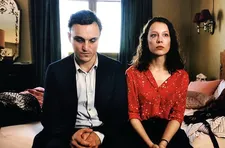 |
| Georg (Franz Rogowski) with Marie (Paula Beer): "He says they kiss but they just touch their hands." |
CP: Yeah, language. They have to be flexible. They don't have ballast. At the beginning, Franz Rogowski who is Georg, is a man without any ballast. He is empty. He has nothing. And in this moment when he met this little boy and they repair the radio and this song is coming, it's coming from the past. It is coming from a mother and it's coming from a bed and it's warm there and it's a home. In this moment something happens. The ballast is coming back.
AKT: Yes, I felt that.
CP: And when the ballast is coming back you have to fight. For your ballast. I don't want to throw my bag away and my memories away because it's part of me. This was the situation. I like when you have two persons hearing music. That the boy [Driss, played by Lilien Batman] who doesn't understand this song really - for him it's just one of the children's songs in German - so this boy understands everything because he is looking to the face of the adult person.
I remember that when I was very young, like this boy, seven years old, you don't understand many things, but you understand so many things from the adults when there's something not in order. That this marriage is on the border to divorce, because the man and his wife are talking in such an artificial way.
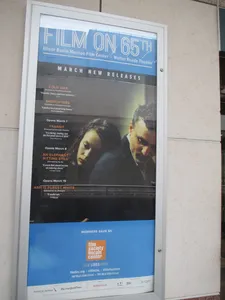 |
| Transit at the Film Society of Lincoln Center Photo: Anne-Katrin Titze |
AKT: I was reminded that when I was five, walking at night [probably early evening when it was getting dark early in winter on walks with my grandparents], looking at the warm lights in the houses, having the fantasy that everybody is happy. Everybody is sleeping in their beds and there's warmth and safety and comfort. And even then, I think, as a five-year-old, I knew it's not true.
CP: That's right.
AKT: That memory came back when Franz was singing the song so beautifully. Later in Transit, he says to the woman with the dogs "Weggelaufen?" He sounds like a child when he asks if the dogs ran away. And it connects back to the song about the animals coming home.
CP: That's right, yeah.
AKT: Now he can't escape it. Now he as the "ballast" as you were saying. As far as the structure is concerned, I like very much that sometimes the narrative voice says something and we see it. "She cried" and she cries (Marie, played by Paula Beer).
CP: Or it's totally different.
AKT: Right, the voice says "They kiss" and they don't kiss. The shifting is for us, the audience? Is it to put us in transit?
CP: Yeah, a little bit but on the other hand it's so … You know a voice-over often in movies is God-like. The author is looking to the world like a giant from above. I like that the voice-over is on the same level like the others. And he's also a character.
AKT: Which we only find out about later on.
CP: But you can feel that something is not in order because he's talking about things which are totally different to the things we have seen. Like the kiss. He says they kiss but they just touch their hands. So he also gets ballast.
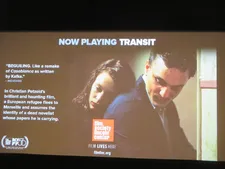 |
| Transit opened in New York on March 1 Photo: Anne-Katrin Titze |
AKT: The voice-over starts 14 minutes in.
CP: Because the whole movie is in this moment, when Franz's Georg starts reading the first book in his life, the manuscript of the dead author. In this moment, the voice-over is coming. It's coming in this moment when he starts to get structure. A fictional structure which gives him a memory and an identity. It's a tragic identity but it's an identity. He's a hero.
Read what Franz Rogowski had to say on Christian Petzold, Transit and The State We Are In feature.
Read what Christian Petzold had to say on Alex Brendemühl and George Romero in Transit, author Anna Seghers, Isabelle Huppert and Claude Chabrol.
Read what Christian Petzold had to say on A Day In The Country, Summer With Monika, The 400 Blows, and looking at us.
Transit is in cinemas and available at Curzon Home Cinema now.











